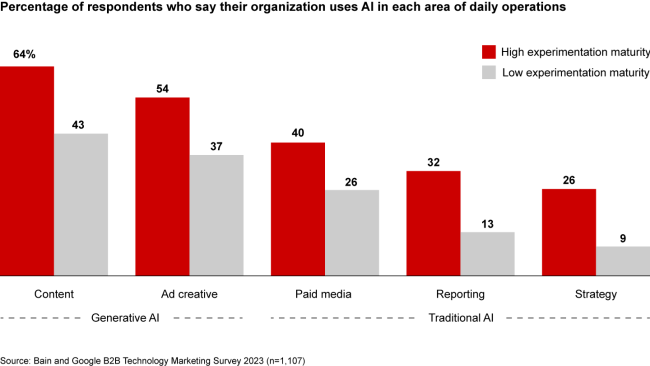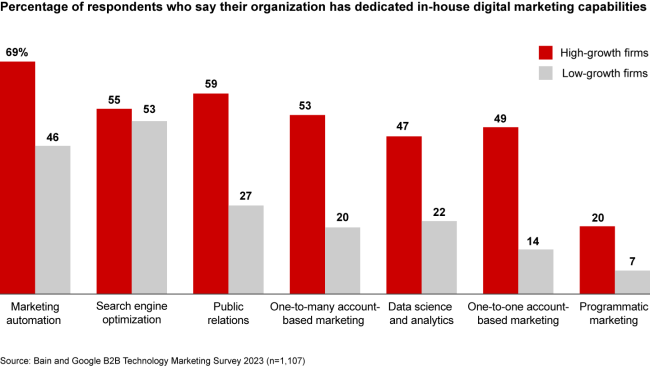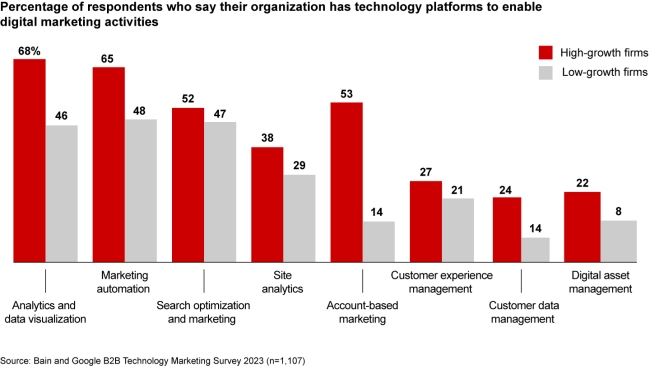Recent research from Google and management consultant firm Bain, ‘The ingredients of strong revenue growth in B2B software’, identified the attributes that differentiate winning B2B software businesses from their peers. The study found best-in-class B2B tech companies are inveterate innovators that embrace the power of AI to supercharge their marketing experiments. They are also decisively data-driven, resolutely measuring, tracking and reconfiguring marketing activities to respond in real-time to customer signals.
Digital experimentation and AI
Leading tech firms are increasingly investing in digital marketing experiments and the application of AI technology. This approach helps them adapt to market changes, optimise customer engagement and innovate marketing strategies.
Revenue-leading organisations in the survey (defined as having high revenue and website traffic growth over the past three to five years) devote 50% more budget and 80% more staff hours to digital marketing experimentation compared with laggards, in part to extract value from innovations such as AI. Other companies that treat experimentation as an afterthought or only pursue it with surplus budget, do not realise the same performance gains.
Firms that are more mature in their experimentation have greater AI adoption (see Figure 1). They realise 30% higher productivity gains versus those without an experimentation strategy. Firms that embrace AI report a 16% average improvement in customer conversion rates.
Figure 1

Source: Bain and Google B2B Technology Marketing Survey 2023
‘Game-changing experiments’, also featured in this month’s In-Flight, delves deeper into this subject.
Advanced measurement techniques
High-growth companies use a broader array of marketing measurement methods across the customer lifecycle. They track a wider range of metrics and exhibit 30% greater confidence in these methods.
This comprehensive measurement allows for improved decision-making and better alignment between marketing initiatives and revenue goals. According to the survey, they are two to three times more likely to measure signals such as account engagement and intent-based data.
In-house skills and technology
The study found that successful companies build robust in-house capabilities, particularly around digital marketing and AI. This internal expertise enables them to execute sophisticated marketing strategies effectively and efficiently (see Figures 2 and 3).
Specifically, the survey found, revenue-leaders are two to six times more likely to have advanced in-house capabilities such as data science and analytics, marketing automation and account-based marketing.
Figure 2

Source: Bain and Google B2B Technology Marketing Survey 2023
Figure 3

Source: Bain and Google B2B Technology Marketing Survey 2023
Leaders also report tight collaboration between marketing and sales through aligned revenue incentives. Some companies have broken the silos separating sales and marketing by creating revenue marketing teams that oversee the end-to-end sales funnel and measure the effects of marketing campaigns. The joint approach makes marketing more agile, gives a company a clear view of the entire customer experience and accurately gauges the impact of marketing campaigns.
Keeping customers
In the B2B software space, as in most industries, holding onto customers is key.
Without customer retention and renewals, it’s game over.
Companies that segment customers based on potential value and risk, and tailor their retention strategies to different customer groups, boost their results. This approach helps maintain revenue and leverages existing customer relationships for upselling and cross-selling opportunities.
Outsize revenue growth
By learning from the leading lights of B2B tech and adopting proven strategies, ambitious firms in the sector can increase their odds of consistent revenue growth and stay ahead in a competitive and fast-moving marketplace.










